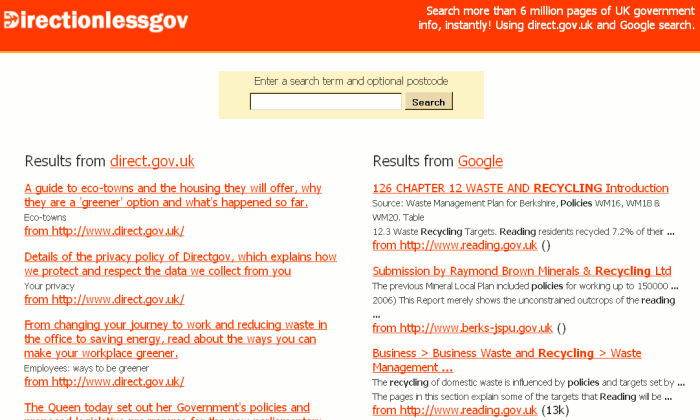Wordle of Gordon Brown’s speech “Building Britain’s digital Future” http://www.wordle.net/show/wrdl/1813010/Gordon_Brown_on_building_Britains_digital_futurel

Gordon Brown outlined the UK government’s plans for “Building Britain’s Digital Future” this morning. (Twitter hashtag #bbdf). On re-reading the draft of my comments on the event it struck me that I have become a Grumpy Old Woman. I might been more positive had I not tried to watch the live video over a broadband that barely achieves 1 mbps at best. The stop-start-stop-stop nature of my viewing did nothing for my concentration and everything for my exasperation. At the same time I was following #bbdf on Twitter and the tweets suggested that I had missed some key points. And that is the problem with these wonderful plans to persuade us all to access and use public services online. It requires everyone to have a fast, reliable broadband connection. Without that how can I as a citizen be sure of the integrity of the information that I am receiving, that the electronic form I have just submitted has indeed been sent, or that the data held about me is correct?
Fast broadband access is central to the government’s plans: every household is to have access to broadband by 2012. Oops, sorry – that should have been nearly every household. (Definition of “nearly” please?). Also, that only refers to existing broadband services so if you end up in the slow lane at 256 kbps you are stuck there! But be of good cheer. There are plans to add a charge of 50 pence a month to each household’s phone line “to help fund a partnership with the private sector for a superfast broadband network right across Britain”. This is supposed to be in place by 2020 but exactly how many will have access and how it will be implemented seems to be up to the “partnership” – no details other than the broadband tax were mentioned. Neither is “superfast” defined. I assume it is going be faster than my pathetic 1Mbps in which case there is going to have to be fibre optic in these ‘ere hills instead of copper, and that is going to cost us more than a measly 50p a month per phone line.
Gordon, or rather his speech writers,were keen to make us aware that he knows all the jargon, although “semantic web” and “linked data” have more sinister connotations when uttered by a member of the government. We are also going to be treated to an iPhone app. I thought that he said this was to be free but it has been spotted for sale with a price tag of £1.99. I checked the transcript of Gordon’s speech and what he actually said was “we are launching a brand new Number 10 iPhone application that will bring news, video and audio from the downing street website to potentially millions of users completely free of charge.” So the information is free but the application isn’t? We seem to have a new definition of the phrase “completely free”.
Directgov is to be replaced by a “more interactive second generation form of digital engagement” called MyGov. This will be how UK citizens will be expected to “interact” with government and access public services. I honestly cannot see this working given the current track record of government web sites. Directgov’s search engine is so appalling that in desperation the bods at Mysociety.org created a far superior Google custom search engine called Directionlessgov (http://directionlessgov.com/). Try a search on “Building Britain’s Digital Future” in Directionlessgov and compare the results from DirectGov with those from the Google CSE.
Even if you do find the department you need to “engage with” you have to embark on a quest to achieve your goal. You want a pension forecast? You are told you are using an unsupported browser if you log in with anything other than IE 6 or FireFox 2 (“later versions have not been fully security tested”): GAME OVER – GAME OVER. I try and fill in my VAT return online using Firefox: the login pages are full of runic script. I concede defeat, the rebellion is quashed, and I use Internet Explorer rather than face the wrath of HMRC.
One good thing that may come out of this is that public sector employees will need to engage more with citizens (I assume that Gordon means electronically!). Does this mean that at long last central and local government departments will be ditching IE6 and antique operating systems? If they don’t, how can they “engage” with citizens in the new personalised, social media driven government world? And who is going to pay for upgrades to the hardware so that they can then upgrade the software so that they can then use social media to “engage” with us, the citizens?
But there is some really good news in Gordon’s speech. He referred to the launch of data.gov.uk saying that “this initiative has attracted – globally – has been very striking.” But there’s more. “The Department for Transport and the transport industry are today making available the core reference datasets that contain the precise names and co-ordinates of all 350 thousand bus stops, railway stations and airports in Britain.” In addition, public transport timetables and real-time running information, which is currently owned by the operating companies, will have to be made freely available as a condition of future franchises. Note, though, that this applies to future and not existing franchises 🙁
Even better news (possibly) for those of us lobbying for Ordnance Survey data to be made freely available:
“Following the strong support in our recent consultation, I can confirm that from 1st April, we will be making a substantial package of information held by ordnance survey freely available to the public, without restrictions on re-use.”
Again, there is room for manoeuvre on this: what will be included in the “substantial package” and “further details on the package and government’s response to the consultation will be published by the end of March.”
To research, support and realise this grand vision of Digital Britain we are to have a new Institute of Web Science. It will be “based here in Britain and working with government and British business to realise the social and economic benefits of advances in the web“. This sounds ominously like another money wasting quango, but it will be headed by Sir Tim Berners Lee and Professor Nigel Shadbolt. If those two are given free rein we should be spared ludicrous reports such as those generated by Consumer Focus (“Mandy quango says Apple, Amazon are too obscure” The Register http://www.theregister.co.uk/2010/03/22/consumer_focus_survey/). In addition Martha Lane Fox is to become the UK’s digital champion and help establish a new digital public services unit.
At the end of the presentation I was left wondering about those who will not able to participate in this great vision of the future, either because they are the ones who are not included in the “nearly every household connected to broadband” or because they may not want to. It also assumes that the interconnections between the different government departments will really work and that the data they have on us is accurate. In his speech Gordon Brown spoke of doctors holding video consultations from their surgeries with patients at home. For that to happen the doctor has to have accurate and up to date medical records for the patient. As I know only too well medical records may not only be wrong but may also have disappeared altogether. (See You haven’t been ill enough so we assumed you were dead http://www.rba.co.uk/wordpress/2010/03/16/you-havent-been-ill-enough-so-we-assumed-you-were-dead/). I now wonder what other personal data about me is wrong or has gone missing.
There will have to be an election soon and there will be many opportunities for all of this to be forgotten. Even if Labour are re-elected the wording of this speech is such that there is a plethora of escape routes. As the saying goes I shall believe it when I see it!
The transcript of Gordon Brown’s speech is available at Building Britain’s Digital Future (http://www.number10.gov.uk/Page22897)
